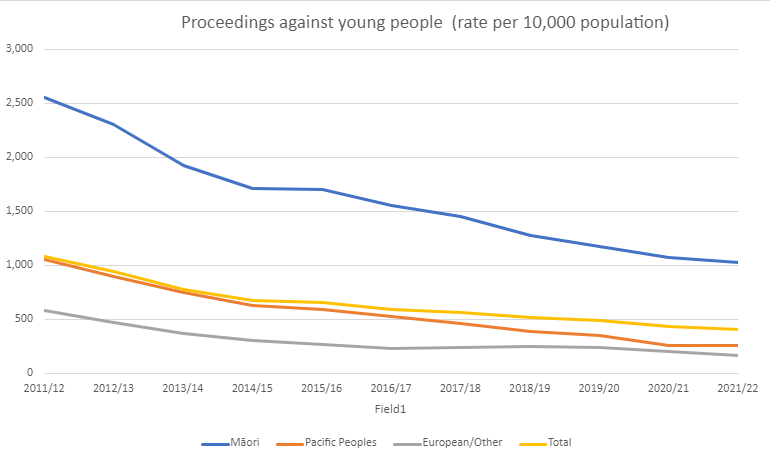Budget 23 makes a start to bringing the Justice sector up to date after decades of under-investment. However more work is still needed.
Funding for supporting victims of family and sexual violence is the highlight of Budget 23.

In Corrections, there is now a 25% shortage in staff. A lack of psychologists means that fewer and fewer people in corrections facilities are receiving vital rehabilitation.
Josephine O’Connor- PSA Organiser for Corrections
STATE OF THE SECTOR
The Justice sector continues to suffer from decades long under-investment. While the 2022 Budget’s “Justice Cluster pilot” has gone some way in addressing these issues, much work is still needed, especially in ensuring that access to justice is achieved.
Access to justice
Delays in court and tribunal hearings due to a lack of resources continues to be a major barrier to accessing justice. Queues for hearings have continued to increase since the last Budget, particularly in Auckland. A lack of funding for modernisation of infrastructure continues to be an ongoing problem. Currently the courts do not have a fully virtual filing system, creating difficulties in scheduling and timetabling.
Workforce retention
The Ministry of Justice and tribunals are having difficulty recruiting and retaining a workforce with core specialist capabilities in the tight labour market. Additional funding released in late 2022 enabled the implementation of negotiated pay increases for Ministry of Justice staff. These increases have been transformative in this historically lowest-paid part of the public service.
Workforce is also a key issue in Corrections, both for Prison Services and Community Corrections (probation and community sentences). In both services, worker shortages and vacancies are compounding a vicious cycle that inhibits the agency delivering on outcomes. Inability to recruit and high vacancies mean high workloads where staff can’t be released for training, and those subject to sentences can’t access the services they need.
Prior to the pandemic, PSA members in the Justice Sector were already the lowest paid workers in the core public service. The combined impact of the subsequent Covid-19 pay restraint and the rise in the cost of living over the past 18 months has resulted in real wages for these workers slipping further backwards.
Wage theft
MP Ibrahim Omer’s wage theft Private Member’s Bill has been pulled from the biscuit tin, hoping to combat the unlawful withholding of wages, salaries, and other monetary entitlements owed to workers. This pernicious issue remains unaddressed in New Zealand law.

BUDGET ACTIONS
As signalled in a pre-Budget announcement, Ministers Radhakrishnan and Davidson announced nearly $75 million in earmarked funding for schemes to tackle family and sexual violence.
This includes:
- Extension of the Family Violence Help Portal.
- Advocacy and dispute resolution services funding for tamariki and rangatahi.
- Increasing capacity and expansion of the Waitematā Safeguarding response; and
- Kaupapa Māori specialist sexual violence services.
There are some key movement in funding aimed at assisting Corrections and the Ministry of Justice. This funding that was offset by a number of old initiatives that were decreased or moved around within the portfolio. These included
- $2 million to assist in clean-up and, to assist in the re-establishment of Corrections functions in response to the North Island weather events.
- An increase of $1.6 million to develop workforce capability and capacity through the Frontline Safety and Improvement Programme
- An increase of $1.5 million which was transferred out of this appropriation in 2022/2023 to fund an increase in Ministerial Services work.
- An increase of $844,000 to maintain critical infrastructure and digital technology to ensure the delivery of Corrections services, and
- An increase of $510,000 in pre-trial services that provides early support to lower the number of people entering (or remaining) in custody.
An additional $18.72 Million over the next 4 years is allocated to address ‘critical compliance risks and asset failures’ in relation to Corrections’ water infrastructure.
The Ministry of Justice will also receive more than $21 million over the next 4 years under an initiative to improve access to ‘Family Violence Programmes in Court and the Community’.
CTU ANALYSIS
Initiatives like Hokai Rangi provide starting point for improving our justice system . However, an increasing proportion of the prison population has complex needs, and specific funding is needed to address this.
We must recognise the increasing need for mental health professionals to be part of Corrections staff, and securing effective training for mental health professionals. The Budget recognises Corrections Staff provide Health and Disability support, but the scope of this is not fully reflected with Corrections receiving the smallest portion of the funding set aside for ‘Health and Disability Sector Support Worker Rates Adjustment.’
On the whole, funding Corrections and the Ministry of Justice, for core services has remained largely stable. For both of these agencies, the Budget has delivered funding to apply the Public Service Pay Adjustment to workers. More will need to be done to address workload, safety and turnover issues.
Modernisation of the court system and, a targeted approach to ensuring access to justice is still needed. Addressing staff retention issues in Corrections should be an urgent priority. However, the Court system and Corrections have benefitted from increases in funding outside the allocations in the 2022 ‘Justice Cluster’ pilot. This significant increase in spending will hopefully lay the groundwork for radical improvements in the sector.